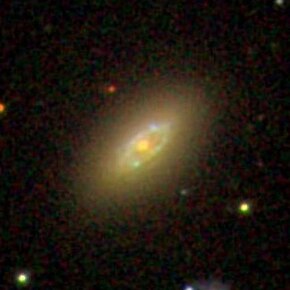NGC 7836 is an irregular spiral galaxy located about 260 million light-years away in the constellation Andromeda.[2][3] It was discovered by the astronomer Lewis Swift on September 20, 1885.[3]
| NGC 7836 | |
|---|---|
 SDSS image of NGC 7836. | |
| Observation data (J2000 epoch) | |
| Constellation | Andromeda |
| Right ascension | 00h 08m 01.6s[1] |
| Declination | 33° 04′ 15″[1] |
| Redshift | 0.016358[1] |
| Heliocentric radial velocity | 4904 km/s[1] |
| Distance | 260 Mly (80 Mpc)[1] |
| Apparent magnitude (V) | 14.4 [1] |
| Characteristics | |
| Type | Irr?, Sb[1] |
| Size | ~83,000 ly (25.5 kpc) (estimated)[1] |
| Apparent size (V) | 0.9 x 0.5[1] |
| Other designations | |
| CGCG 498-79, CGCG 499-51, IRAS 00054+3247, KUG 0005+327, Mrk 336, NPM1G +32.0005, PGC 608, UGC 65[1] | |
NGC 7836 is a member of the NGC 7831 Group and is part of the Perseus–Pisces Supercluster.[4][5][3][6]
See also
editReferences
edit- ^ a b c d e f g h i j "NASA/IPAC Extragalactic Database". Results for NGC 7836. Retrieved 2019-03-11.
- ^ "Your NED Search Results". ned.ipac.caltech.edu. Retrieved 2019-03-11.
- ^ a b c "New General Catalog Objects: NGC 7800 – 7840". cseligman.com. Retrieved 2017-08-11.
- ^ Vettolani, G.; Baiesi Pillastrini, G. C. (1987-03-01). "Alignments of galaxies in the Perseus supercluster". Astronomy and Astrophysics. 175: 9–14. Bibcode:1987A&A...175....9V. ISSN 0004-6361.
- ^ Cabanela, J. E.; Aldering, G. (1998-09-01). "Galaxy Alignments in the Pisces-Perseus Supercluster Revisited". The Astronomical Journal. 116 (3): 1094–1117. Bibcode:1998AJ....116.1094C. doi:10.1086/300484. ISSN 0004-6256.
- ^ Garcia, A. M. (1993-07-01). "General study of group membership. II - Determination of nearby groups". Astronomy and Astrophysics Supplement Series. 100: 47–90. Bibcode:1993A&AS..100...47G. ISSN 0365-0138.
External links
edit- Media related to NGC 7836 at Wikimedia Commons
- NGC 7836 on WikiSky: DSS2, SDSS, GALEX, IRAS, Hydrogen α, X-Ray, Astrophoto, Sky Map, Articles and images